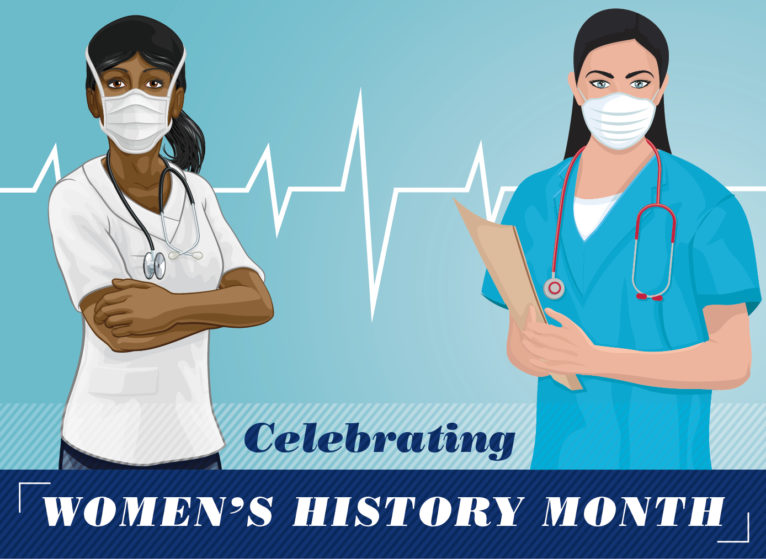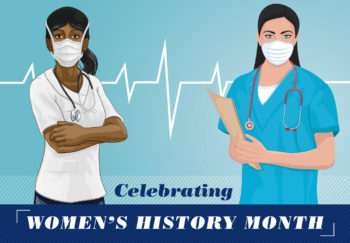Born in New York and raised in Delaware, UVA Health's Kirsten Greene, MD, is a urology surgeon and among only a handful of women to lead a urology department. She has always wanted to be a doctor. There are old photos of her at age 3 dressed up for Halloween in scrubs with a stethoscope. Despite moving up and down the East Coast as a kid and her travels throughout her adult life, she and her husband settled in Charlottesville because, according to her, “It’s a magical place to live, and my husband and I love it.”
About this series: The path to becoming a surgeon is never easy. But for women, who have historically been underrepresented in the field, the barriers to becoming a surgeon are even higher. This March, UVA Health joins the national commemoration of Women’s History Month by celebrating just a few of our history-making female surgeons.
Greene is a Wahoo. She received her bachelor’s degree from UVA, graduating as an Echols and Jefferson Scholar. She went on to get her medical degree from the Johns Hopkins University School of Medicine. Greene specializes in caring for patients with cancer of the prostate, kidney, bladder, ureter, urethra, penis, scrotum, and testicles. She’s chair of UVA Health's department of urology and associate chief medical officer for UVA Health.
Fulfilling Her Dream
Healthy Balance sat down with Greene, who joined UVA Health in 2019, to learn more about her journey to becoming a urology surgeon. Here’s what she had to say.
Q: WHAT INSPIRED YOU TO GO INTO MEDICINE AS A PROFESSION? AND WHY SURGERY IN PARTICULAR?
I have always wanted to be a surgeon, from the time I was a little kid. No one in my family is in the medical field so we never knew why I decided this, but it was always what I knew I would do.
Q: WHAT MADE YOU CHOOSE YOUR SPECIALTY?
I've always loved surgery, every type of surgery, but especially cancer surgery. General surgery is where I started, with the plan to be a surgical oncologist. I then happened to rotate on urology as a general surgery intern and realized that it was the field for me. I like that I can take care of men and women, and do surgery on many different organs (kidney, adrenal, bladder, prostate). Urology is very technology-intense, and that is continually interesting and fun. I love my patients and colleagues and the personality of the field is just a fit.
Q: WHAT QUALITIES DOES IT TAKE TO BE A SUCCESSFUL SURGEON?
You must love operating, since this is how you spend most of your time. And it helps to also love working with people. All day long I’m interacting with patients and colleagues and talking constantly. So you have to enjoy the combination of this social interaction with the focus and technical aspect of surgery. Both are fun.
You also must be patient enough to get through the training, and stubborn enough to not listen to all the people who tell you that you shouldn’t be a surgeon. People like to give dumb advice to male and female medical students telling them that surgery is too hard, you can’t have a life, do anything else, etc. Surgery is great! If you’re reading this article, don’t listen to the people who tell you not to be a surgeon. It is awesome, and anything good is worth fighting for.
I like feeling that I’m making a difference every day... If I’m going to be working hard, I want it to make a difference and help someone.
Q: DO YOU HAVE ANY ROLE MODELS? IF SO, HOW DID THEY IMPACT YOUR DECISION TO BECOME A UROLOGY SURGEON?
My surgery role models are:
- Nancy Ascher, MD, former chair of surgery at UCSF when I was a resident.
- John Cameron, MD, former chair of surgery at Johns Hopkins when I was a student.
- Peter Carroll, MD, chair of urology at UCSF during my residency.
- Jack McAninch, MD, program director at UCSF during my residency.
- Max Meng, MD, Marshall Stoller, MD, and Donna Deng, MD, who are my friends and taught and encouraged me and still do.
When I was a student, I remember residents telling me that women just weren’t technically as good surgeons as men. Now, we all know that this is completely untrue, but working with Dr. Ascher and seeing her operate just made my heart sing and think of how backward and wrong those ignorant comments were. She is the most beautifully talented surgeon I have ever seen. There is a documentary on Netflix about her skill. Dr. Peter Carroll convinced me to switch to become a urology surgeon and is also a phenomenal surgeon who seamlessly went from being a stellar open surgeon to being a stellar robotic surgeon. He and the others I mentioned taught me how to operate and encouraged me to be better.
Q: DO YOU THINK OF YOURSELF AS A ROLE MODEL FOR OTHER WOMEN WHO WANT TO BECOME SURGEONS?
I hope I am, and I’m happy to talk to anyone or help anyone who is thinking about being a surgeon.
Q: WHAT ASPECTS OF PRACTICING MEDICINE DO YOU LIKE THE MOST?
I like feeling that I’m making a difference every day. I don’t have days where I think, “Well, I did nothing today.” And I know some of my friends in non-medical fields feel like this sometimes. If I’m going to be working hard, I want it to make a difference and help someone. I also really like operating because it is very satisfying working with your hands and doing something tangible.
Q: WHAT WAS SOMETHING THAT SURPRISED YOU OR THAT YOU DIDN'T EXPECT ABOUT PRACTICING MEDICINE?
I didn’t realize it involves so much interpersonal interaction and social skills. You can’t be a good surgeon and not be able to talk with people. And there is a learning curve to this to do it well. You have to be able to explain complex topics and decisions to people who aren’t experts, and you have to communicate to people that you care about them, want them to ask questions, and value their opinion.
There aren’t classes to teach you this in medical school, or at least there weren’t when I went to medical school. So you have to reference the other aspects of your life and friendships to help you.
The other surprising thing, pre-Covid, was how many hugs you get as a surgeon. I miss it now.
Q: HAVE YOU FELT THAT GENDER WAS A BARRIER TO YOUR SUCCESS OR TO BECOMING A UROLOGY SURGEON? WAS IT DIFFICULT TO SUCCEED IN A MALE-DOMINATED FIELD?
Yes and no. Yes, in the sense that I’m in a predominantly male specialty and I was, and am, perhaps left out of the decisions that happen over natural social conversations and gatherings between friends (think men’s room, golf, drinks, etc). If these friends are also making decisions about promotion, committees, awards, then women are excluded despite the fact that it isn’t intentional.
No, in the sense that most of my male colleagues care about gender equity and diversity and often reach out to me to participate, since I’m one of only 7 women in the U.S. who is a chair or chief of a urology department or division. So in some ways being a woman in a mostly male field has helped me, because I have colleagues who believe in equity and try to actively get women and diverse opinions heard and involved.
Q: LOOKING BACK, WHAT WOULD YOU TELL YOUR YOUNGER SELF ABOUT THE JOURNEY TO BECOMING A DOCTOR?
“Calm down!” I would point out that it is a marathon and not a sprint. I'd tell myself that everyone who told me not to be a surgeon, that surgery is too hard, that I would never make it, that I would not have a life, was WRONG. I would also tell myself that my career path would be a windy one and to not freak out whenever things didn’t go perfectly according to my 10-year (ok, 20-year) plan. Sometimes life throws obstacles in your path to get you to look around and see a different way to go. It has taken me a long time to appreciate this, and I still have to remind myself of it when I’m struggling with something.
Q: WHAT KEEPS YOU SANE?
My husband, best friends, dogs, family, and the many hundred plants in my house that I water when I’m stressed.



Love this interview and what an inspiration is Dr. Greene. Young women today need such role models to remind us that talent and humanitarian values are a winning combination. My wish for my granddaughters are that they develop their abilities and not question their dreams. We surely need gifted physicians who are dedicated to healing those in need. Dr Greene is an inspiration !